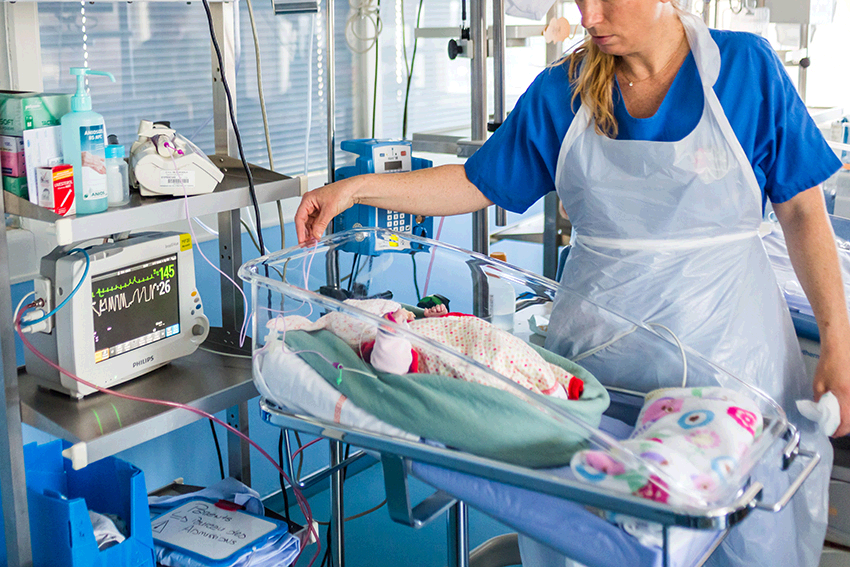Platelet donation
Find out more about switching to platelets
A study evaluating platelet transfusions in premature babies yielded unexpected results.
Platelets are the cells that help the blood to clot. Transfusions of platelets are often given to babies with low platelet counts and no signs of bleeding, to try to prevent bleeding (so-called prophylactic platelet transfusions).
However, before the study, doctors were unsure of the best platelet count at which they should start giving transfusions to these babies with low platelet counts (thrombocytopenia).
 To find out, PlaNet-2 (Platelets for Neonatal Transfusion study 2) was launched in UK, funded by NHSBT, and in partnership with Sanquin Blood Supply Foundation in the Netherlands.
To find out, PlaNet-2 (Platelets for Neonatal Transfusion study 2) was launched in UK, funded by NHSBT, and in partnership with Sanquin Blood Supply Foundation in the Netherlands.
It compared whether initiating a platelet transfusion in premature, sick babies is better at a higher or a lower platelet count threshold, and whether this would have an impact on the risk of death and major bleeding in these babies.
The study found that giving platelet transfusions was better for babies when applying a lower platelet count trigger.
Overall, the findings indicated that a lower threshold for platelet transfusions would prevent death or major bleeding in 7 out of 100 premature newborn babies with severe thrombocytopenia.
In the study, premature babies with a platelet count below 100,000 per cubic millimetre (normal platelet counts are above 150,000 per cubic millimetre) were identified on the participating neonatal units, and the parents then informed about the trial.
After parental consent was provided, and when their platelet counts fell below 50,000 per cubic millimetre, babies were allocated randomly into one of two groups:
One group of babies received a platelet transfusion when their platelet count dropped below 50,000 per cubic millimetre (high threshold study arm).
The other group received a platelet transfusion only when their platelet count dropped below 25,000 per cubic millimetre (low threshold study arm).
The study was carried out over a 6-year period and involved 43 paediatric or neonatal units in the UK, Ireland and the Netherlands. A total of 660 premature babies with low platelet counts (severe thrombocytopenia) were included in the study, making it the largest such study to date.
Unexpectedly, researchers found that giving more platelet transfusions to babies at the higher platelet count (the high threshold study arm) was associated with a worse outcome (mortality and major bleeding in the next 28 days), compared with only transfusing babies whose count had dropped lower (low threshold study arm).
Co-chief investigator, Professor Simon Stanworth, is a consultant haematologist at NHS Blood and Transplant and the John Radcliffe Hospital in Oxford.
He says, “Studies like this are only possible with the huge support and dedication of parents and staff across many hospitals and in NHS Blood and Transplant (NHSBT), and with help from many colleagues in the Netherlands and Ireland.”
Professor Stanworth, who is also a researcher at the John Radcliffe Department of Medicine at Oxford University, adds, “The findings have major implications for how neonatologists use platelet transfusions for sick premature babies with low platelets.”
Doctor Andrew Cox, consultant neonatologist at East Lancashire Hospitals NHS Trust, says, “We really appreciate the selflessness of parents who agree to enrol their unwell babies into clinical trials such as the PlaNet -2 trial.
“This trial has a clear outcome which will improve the care of sick premature babies in units across the country and overseas.”
A Randomised Trial of Neonatal Platelet Transfusion Thresholds (Curley A, Stanworth, SJ et al) was published in New England Journal of Medicine on 2nd November 2018
The study was funded by NHS Blood and Transplant (NHSBT), Sanquin Research, Amsterdam in the Netherlands and Addenbrooke’s Charitable Trust Neonatal Breath of Life Fund. It was supported by the NHSBT Clinical Trials Unit and was adopted on the NIHR portfolio of clinical trials.
You can follow the study on Twitter at @PlaNeT2_trial